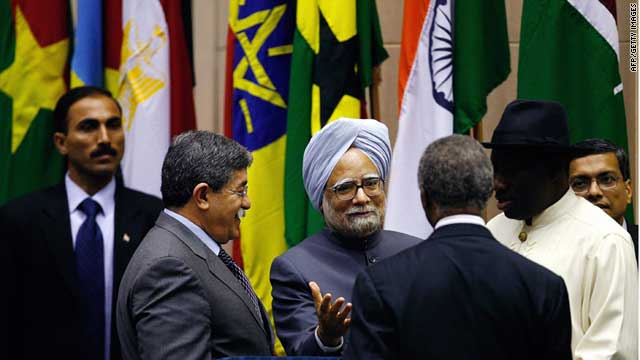The 2013 edition of the India-Africa business forum took place in New Delhi, India from the 17 to the 19 Mach 2013. The 2013 Confederation of Indian Industry (CII)-EXIM Bank Conclave on India Africa Project Partnership was pivoted on the premise that India and Africa have a common goal to furnish the developing world with an opportunity to improve on their trade, oil and gas, mining, agricultural, tourism as well as the environment sectors. Anad Sharma, India’s Minister of Commerce, Industry and Textiles, opened this very important forum.
So far there have been eight (08) Conclaves. In the past, these Conclaves have been attended by the Vice President of Burundi (2007), the Vice President of Tanzania (2008), the Vice Prime Minister of Mauritius (2009), the Vice President of Ghana (2010), the Prime Minister of Togo (2010 & 2011), the Prime Minister of Mozambique (2011), the Vice President of Zimbabwe (2012) and the Prime Minister of Central African Republic (2012). A host of government Ministers from Africa have also participated at the Conclaves.
From the last eight Conclaves from 2007 to 2012, 1510 projects worth USD 104 billion have been deliberated. Cameroon was the “Guest Country” and Ethiopia was the “Focus Country” for this 9th Conclave.
According to an article in Cameroon Tribune dated the 19 of March 2013, Cameroon’s Prime Minister, Head of government, Philemon Yang told Indian investors at the opening of the 2013 edition of the India-Africa Conclave that Cameroon is blessed with untapped investment opportunities. He added that project partnership is germane in bringing to fruition these untapped areas of interest. For instance, just 1.8 billion cubic meters of the state’s estimated 695 billion cubic metres of gas has been exploited. The state also plans to construct a gas liquidation plant in Kribi. Cameroon equally possesses vast forests which are sources of timber and other forest products. “These forests also create climate conditions that favour the production of diversified agricultural products such as cocoa, banana, rubber, palm oil and a host of other tropical fruits,” added the Prime Minister of Cameroon.
Cameroon’s Prime minister, Philemon Yang thus used the opening ceremony at the Taj Palace to present Cameroon’s investment potentials in the mining, agricultural, petroleum, gas, transport and power supply sectors. Philemon Yang projected Cameroon’s image as one of the favourable destinations for investors in Africa. He made reference to a couple of laws the state of Cameroon has enacted to improve investment incentives, curb tariff barriers, furnish an environment for free enterprise, and ease trade and capital flows.
Concurring with the report of Cameroon Tribune dated the 19 of March 2013, the 2013 edition of India-Africa Conclave, comes shortly after Cameroon’s diplomatic representation in New Delhi was created. The Prime Minister considered a will to facilitate economic exchanges to prevail between India and Cameroon. At the end of the Conclave, the delegation from Cameroonian and Indian investors signed Memorandums of Understanding in the agriculture, mining and tourism sectors.
It is always a great idea for partnership to be cemented between states when it comes to investment and economic exchanges. All the same such partnership remains meaningless if there still exists tariff barriers, a harsh environment for free enterprise, and bottle necks that hinder trade and capital flows. Although Cameroon has put in place several laws to curb these impediments, state practice shows that the state of Cameroon still has a long way to go. Ensuring that Cameroon as well as other African states benefit from the 2013 edition of the India-Africa business forum entails more than empty promises. There is need for the state of Cameroon as well as other African states to ensure that state practice reflects institutional provisions that promote free markets and trade. It does not suffice to have laws in place which are not respected by state authorities.
Additionally, the private sector in African states especially in Cameroon needs to be invigorated. Indian investors would definitely need to cement business deals with private operators in African states reason why there is need for central governments in Africa to make the business environment conducive for all and sundry by also ensuring that the taxation laws are not stringent.
Chofor Che is an associate of AfricanLiberty.org and an integral part of the Voice of Liberty initiative. He is also a Doctoral Law candidate at the University of the Western Cape and blogs at http://choforche.wordpress.com/.


